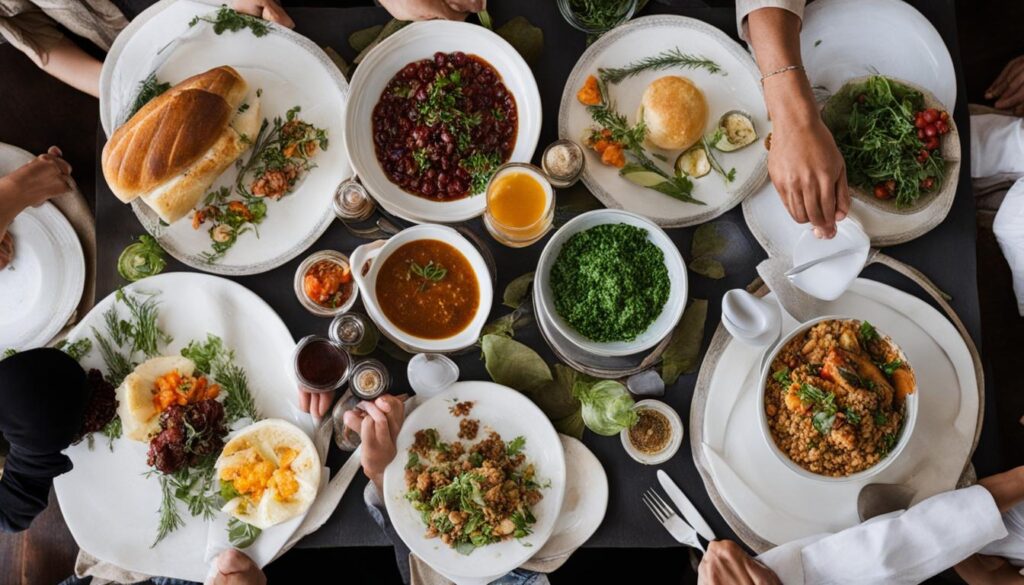Prayer before eating is a sacred practice that holds the power to transform our daily meals into moments of spiritual connection and gratitude. It allows us to pause, reflect, and express our appreciation for the nourishment before us. In this article, we will explore the importance of prayer before eating, how to incorporate it into our daily lives, and the profound benefits it brings to our overall well-being.
Key Takeaways:
- Prayer before eating is a spiritual practice that cultivates gratitude and deepens our connection with God.
- It is an opportunity to express thanks for the food before us and seek blessings and guidance.
- Prayer before eating can be done individually or as a family, silently or out loud.
- By making it a daily habit, prayer before eating nourishes our soul and fosters mindfulness and peace.
- It is important to respect and appreciate the diverse traditions and practices surrounding prayer before eating.
The Importance of Prayer Before Eating
Prayer before eating holds significant importance in many religious traditions and is commonly referred to as saying grace. It is a practice that allows individuals to pause and acknowledge the blessings of the food they are about to consume, expressing gratitude to God for providing nourishment.
“Saying grace before meals is a form of prayer that can deepen our spiritual connection and foster a sense of mindfulness and gratitude.”
By taking a moment to say a prayer for food, individuals can cultivate a deeper connection with their spirituality and develop a sense of mindfulness. It serves as a reminder of the abundance and blessings they have in their lives, helping them appreciate the food they consume and the nourishment it provides.
“Prayer before eating not only nourishes the soul but also helps cultivate a sense of mindfulness, gratitude, and connection with God.”
The Power of Giving Thanks for Our Meals
When we engage in prayer before eating, we are offering thanks to God for the sustenance we are about to receive. This act of giving thanks not only fosters a sense of gratitude but also cultivates a deeper spiritual connection with the Divine.
“Prayer before meals creates a sacred space in which to reflect on the blessings in our lives and deepen our appreciation for the food we consume.”
By acknowledging and expressing gratitude for the food before us, we enter into a state of mindfulness and presence, allowing us to savor the moment and find peace and contentment in the simple act of eating.
| Benefits of Prayer Before Eating | Ways to Incorporate Prayer Before Eating |
|---|---|
|
|
Prayer before eating is a powerful practice that can transform our relationship with food, spirituality, and gratitude. It allows us to recognize the abundance in our lives and fosters a deeper connection with God. So, before you take your next bite, consider pausing and saying a prayer of thanks for the nourishment before you. Embrace the transformative power of prayer and experience the blessings it brings to your meals.
Incorporating Prayer Before Eating
Prayer before eating is a meaningful practice that can add a spiritual dimension to mealtime. It allows us to express gratitude and seek blessings for the food we are about to consume. There are several ways to incorporate prayer before eating into our daily routines, whether it is a simple blessing or a personal prayer of gratitude. By taking a moment to pause and acknowledge the food before us, we can cultivate mindfulness and a deeper connection with God.
One way to incorporate prayer before eating is by reciting a traditional blessing or prayer. Many religious traditions have specific prayers that are said before meals, such as the “Grace Before Meals” in Christianity or the “Blessings over Food” in Judaism. These prayers can be recited silently or out loud, depending on personal preference. They serve as a way to express thankfulness for the nourishment provided and to invite God’s presence into the meal.
Another way to incorporate prayer before eating is by creating a personal prayer of gratitude. This allows for a more intimate and heartfelt connection with God. You can personalize the prayer by expressing specific thanks for the food, recognizing the efforts of those involved in preparing it, and asking for blessings for those in need. Prayer before eating can also be a family ritual, with each member taking turns to offer their prayers or using a shared prayer that resonates with everyone.
Prayer before eating can be done at the dinner table or in any setting where food is being consumed. It is a valuable practice that can bring peace, gratitude, and mindfulness to our meals. By incorporating prayer into our daily lives, we invite a sense of spirituality and connection with God, transforming our eating experiences into moments of reflection and gratitude.

Incorporating Prayer Before Eating:
- Recite a traditional blessing or prayer
- Create a personal prayer of gratitude
- Include family members or friends in the prayer
- Practice prayer before eating in any setting
The Benefits of Prayer Before Eating
Prayer before eating not only nourishes the soul but also helps cultivate a sense of mindfulness, gratitude, and connection with God. It can create a sacred space in which to reflect on the blessings in our lives and deepen our appreciation for the food we consume. Prayer before meals also helps to slow down and savor the moment, fostering a sense of peace and contentment.
When we take a moment to pause and offer a meal blessing, we are reminded of the abundant blessings we have received. It shifts our focus from the busyness of our lives to a place of gratitude and awareness. This simple act of prayer before eating allows us to acknowledge the source of our sustenance and express our thanks for the nourishment provided.
Moreover, prayer before meals can help us develop a deeper connection with God. It serves as a reminder that we are dependent on Him for our daily bread and invites His presence into our lives. Through prayer, we invite God to bless the food we eat, infusing it with His grace and sanctifying our meals.
Prayer before eating is like a spiritual feast that nourishes our souls and uplifts our spirits. It reminds us of the many blessings in our lives and helps us cultivate a heart of gratitude and mindfulness. As we offer a meal blessing, let us remember to slow down, savor the flavors, and embrace the sacredness of the moment.
The Power of Mindfulness
Prayer before eating helps us cultivate a sense of mindfulness. By taking a moment to pause, we become more present and aware of the food before us. We can engage our senses fully, savoring the flavors, textures, and aromas of the meal. This mindful approach to eating allows us to fully appreciate the nourishment provided and experience a deeper connection with our food and with God.
- Mindful eating encourages healthier food choices, as we become more attuned to our body’s needs and signals.
- It reduces overeating and promotes portion control, leading to improved digestion and overall well-being.
- Mindful eating can also enhance our relationship with food, fostering a healthier attitude towards eating, free from guilt or judgment.
A Heart of Gratitude
Mealtime prayer fosters a spirit of gratitude. By acknowledging and expressing thanks for the food before us, we develop a deeper appreciation for the abundance in our lives. Gratitude has been proven to have numerous benefits for our mental, emotional, and physical well-being.
- Grateful individuals experience higher levels of happiness and contentment.
- They have lower levels of stress and anxiety, leading to improved overall health.
- Gratitude promotes positive relationships, fostering a sense of connection and empathy with others.
By incorporating prayer before meals into our daily lives, we can cultivate a heart of gratitude and experience the transformative power it brings.
The Sacredness of the Moment
When we engage in prayer before eating, we create a sacred space for ourselves and our loved ones. It is a time to pause, reflect, and connect with our spirituality. This sacredness infuses our meals with a deeper sense of meaning and purpose, transforming them into more than just a physical act of nourishment.
Prayer before eating also helps us slow down in a fast-paced world. It encourages us to savor the moment and enjoy the company of those around us. By fostering a sense of peace, contentment, and connectedness, prayer before meals enriches our dining experiences and nourishes our souls.
Different Traditions and Practices
Prayer before eating is a practice that transcends religious and cultural boundaries. It is a way for individuals and communities to express gratitude and seek blessings before consuming food. Different traditions have their own unique ways of incorporating prayer before meals, each with its own rich history and significance.
Christianity: Saying Grace
In Christianity, saying grace before meals is a common practice. It is a moment to pause and acknowledge God’s provision, express gratitude for the food, and seek His blessings. Grace before meals can be a simple prayer or a longer invocation, depending on personal or religious preferences. It is usually led by one person or, in family settings, by the head of the household.
Judaism: Reciting the Blessings
In Judaism, reciting blessings over food is an integral part of mealtime rituals. These blessings, known as brachot, are a way to acknowledge God’s role as the provider of sustenance. There are specific prayers for different types of food, and they are recited before and after eating. The blessings are often sung or chanted, adding a melodic dimension to the prayer.
Other Practices: Cultural and Spiritual Traditions
Prayer before eating is not exclusive to Christianity and Judaism. Many other cultural and spiritual traditions have their own unique practices and rituals. For example, in Islam, before breaking the fast during Ramadan, Muslims recite a special prayer called the du’a. In Hinduism, food is often offered to deities before being consumed as a form of worship. These diverse traditions highlight the universal human desire to connect with the divine through the act of eating.

Making Prayer Before Eating a Daily Habit
Making prayer before eating a daily habit requires commitment and intentionality. It is a practice that can bring about transformation and deepen your spiritual connection with God. By incorporating prayer before eating into your daily routine, you can cultivate a sense of gratitude, mindfulness, and reverence for the blessings of food.
One way to make prayer before eating a daily habit is to set a specific time for it. Whether it’s before every meal, once a day, or during a designated mealtime, having a consistent schedule can help make prayer a regular part of your routine. Consider creating a peaceful and sacred space at the dinner table or wherever you usually eat, where you can gather your thoughts and focus on expressing gratitude to God.
Involving your family or friends in the practice can also make prayer before eating more meaningful and enjoyable. You can take turns leading the prayer or reciting a chosen prayer together. This shared experience can strengthen your bond as a family or community, fostering a sense of unity and connection through the act of prayer.
Remember, the key to making prayer before eating a daily habit is consistency and intentionality. Approach each meal with a grateful heart and a desire to connect with God. Let prayer be a moment of reflection, gratitude, and surrender. Allow it to nourish your soul as much as the food nourishes your body.

Creating a Routine for Prayer Before Eating
To help you establish a routine for prayer before eating, consider the following steps:
- Choose a designated time: Determine the specific time or meal when you will incorporate prayer before eating into your daily routine.
- Create a sacred space: Set up a space at the dinner table or in your home where you can focus on prayer and create a peaceful atmosphere.
- Select a prayer: Choose a traditional prayer or create a personal prayer of gratitude that resonates with you and your beliefs.
- Involve others: If you have family or friends, encourage them to join you in the practice of prayer before eating. Share the responsibility of leading the prayer or take turns reciting it together.
- Stay committed: Make a commitment to yourself and to God to continue practicing prayer before eating consistently. Over time, it will become a natural and meaningful habit in your life.
By following these steps and embracing prayer before eating as a daily habit, you can deepen your spiritual connection, cultivate gratitude, and experience the transformative power of prayer in your life.
Conclusion
Prayer before eating is not just a ritual; it is a powerful practice that can transform your spiritual journey. By incorporating prayer before meals into your daily life, you can cultivate a profound sense of gratitude, seek divine guidance, and deepen your connection with God. Whether you choose to say grace, offer a personal prayer of gratitude, or follow a specific religious tradition, embracing the blessing before eating can nourish your soul while fueling your body.
The act of prayer before eating creates a sacred space where you can pause, reflect, and express your thanks for the nourishment before you. It encourages mindfulness, allowing you to savor the present moment and appreciate the blessings in your life. As you make prayer before eating a regular habit, it will become a source of peace, contentment, and spiritual renewal.
Across different religious traditions and cultures, prayer before eating takes various forms. Whether it’s saying grace, reciting blessings over food, or observing a specific cultural practice, it is important to respect and appreciate the diversity of traditions surrounding the mealtime prayer. What matters most is that you engage in prayer with heartfelt sincerity and a desire to connect with the divine.
So, as you sit down to enjoy a meal, remember the transformative power of prayer. Offer a blessing before eating, express gratitude for the nourishment, and open your heart to divine guidance. Embrace the spiritual depth that prayer brings to your meals and let it enrich your life, one bite at a time.
FAQ
What is the significance of prayer before eating?
Prayer before eating is a spiritual practice that allows us to express gratitude and seek blessings from God for the food we are about to consume.
How can I incorporate prayer before eating into my daily life?
You can choose to recite a traditional prayer or create a personal prayer of gratitude. It can be done silently or out loud, individually or as a family.
What are the benefits of prayer before eating?
Prayer before eating not only nourishes the soul but also cultivates mindfulness, gratitude, and a deeper connection with God. It helps create a sacred space for reflection and fosters a sense of peace and contentment.
What are different traditions and practices regarding prayer before eating?
Prayer before eating is practiced in various religious traditions and can take different forms. In Christianity, it is often referred to as saying grace, while in Judaism it is known as reciting the blessings over food. Other cultural and spiritual practices also incorporate mealtime prayers.
How can I make prayer before eating a daily habit?
It can be helpful to set a specific time or designate a special place for prayer before meals. Creating a routine and involving family or friends can also provide additional support and encouragement.
What is the power of prayer before eating?
Prayer before eating is a way to express gratitude, seek guidance and blessings, and deepen your connection with God. It has a profound impact on your spiritual journey and can nourish your soul while fueling your body.








